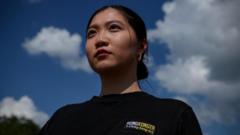The stakes are staggeringly high. Following his announcement to run, the Chinese government placed a bounty on his head of approximately $130,000 for information leading to his capture. This drastic measure indicates the peril Tay faces, stemming from his outspoken criticism of the Chinese regime’s tightening control over Hong Kong and the substantial loss of democratic freedoms there. His vocal disapproval over the years has led not only to threats but also to coordinated digital attacks against his candidacy orchestrated by entities linked to the Chinese government.
Recent Canadian intelligence briefings revealed that, in an attempt to undermine his campaign, these attacks aimed at portraying him as a criminal while attempting to erase his visibility from media platforms targeting the Chinese-speaking community in Canada. This effort to suppress his message ahead of the elections marks a worrying intersection of international politics and local democratic processes. Vanessa Lloyd, director of Canada’s intelligence agency, acknowledged the troubling nature of the situation, which paints a stark picture of the influence of foreign governments in domestic elections.
As Canadians prepare to vote, Tay's challenges reflect a broader concern regarding foreign interference and the complexities of campaigning in a world where personal safety can be at odds with the democratic process. His candidacy remains not just a local political battle but an emblem of the enduring struggle for freedom and expression amidst geopolitical tensions.
Recent Canadian intelligence briefings revealed that, in an attempt to undermine his campaign, these attacks aimed at portraying him as a criminal while attempting to erase his visibility from media platforms targeting the Chinese-speaking community in Canada. This effort to suppress his message ahead of the elections marks a worrying intersection of international politics and local democratic processes. Vanessa Lloyd, director of Canada’s intelligence agency, acknowledged the troubling nature of the situation, which paints a stark picture of the influence of foreign governments in domestic elections.
As Canadians prepare to vote, Tay's challenges reflect a broader concern regarding foreign interference and the complexities of campaigning in a world where personal safety can be at odds with the democratic process. His candidacy remains not just a local political battle but an emblem of the enduring struggle for freedom and expression amidst geopolitical tensions.


















